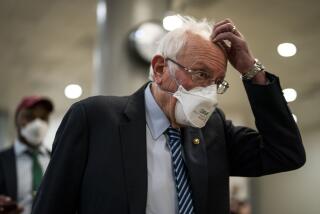POLITICS : Signs Point to a Forbes Bid in 1996 : Millionaire publisher calls GOP candidates sourpusses. He’s likely to decide if he’ll enter race by end of week.
- Share via
NEW YORK — As chief executive officer of the prosperous publishing empire his family founded, Malcolm S. (Steven) Forbes Jr. is an enthusiastic cheerleader for American capitalism and all he says it entails: faith, thrift, hard work and willingness to take risks.
Now, checkbook at the ready, the 48-year-old admirer of Ronald Reagan-era supply-side economics is contemplating whether to take his greatest risk: “a long shot” bid, as he candidly admits, for the Republican presidential nomination.
His decision is expected by week’s end. Friends and business associates anticipate that he will enter the crowded GOP field. Certainly, the signs point in that direction.
Already, he’s opened a campaign headquarters near his New Jersey home and hired key advisers and a pollster. Staffers are exploring ballot access and television markets in key primary states.
His campaign would be a full-fledged effort, with a significant commitment of his own funds, said Forbes, whose financial worth is estimated to be at least $400 million.
As he sat recently in a floor-to-ceiling book-lined conference room at Forbes Inc., on 5th Avenue in Lower Manhattan, he offered his thoughts on the Republican race and what he would bring to it.
Forbes labels the current crop of candidates as lacking in vision and belief in the future. He says they all share “a very glum, sourpuss look on things.”
“I am an optimist,” Forbes said, “and I am a believer both in Ronald Reagan and the message of Jack Kemp,” the former George Bush Administration Cabinet member and one of the most vocal advocates of supply-side economics.
Forbes added: “It is no secret if Kemp was running I’d not consider the race. . . . I assumed that someone like Kemp would run as the true pro-growth, pro-opportunity candidate.”
Quiet-spoken and scholarly, Forbes is far less flashy than his father, the media tycoon Malcolm Forbes, who liked hot-air balloons, motorcycles and Elizabeth Taylor. He died in his sleep at the age of 70 in 1990. Upon his death, skeptics pronounced the end of an era and predicted the decline of the Forbes media empire, founded in 1917 by B. C. Forbes, a Scottish immigrant who was a business columnist for Hearst newspapers.
Instead, under the leadership of Steven Forbes and his three brothers, it has flourished and expanded. In 1994, for the third straight year, the company’s flagship publication, Forbes magazine, carried more advertising pages than any other magazine, according to the Publishers Information Bureau, a trade group. Foreign-language editions of Forbes have started and, among other growth strategies, the company has expanded its chain of weekly newspapers in New Jersey.
Also in New Jersey, Forbes crafted for his childhood friend, Christine Todd Whitman, the centerpiece of her successful gubernatorial campaign: a pledge to cut state income taxes by 30%--which she has fulfilled.
Emerging from his father’s shadow in other ways, Forbes has increasingly played a part in Republican politics on a national level, acting as board chairman of Empower America, a conservative advocacy group.
Nevertheless, he is well aware that elbowing his way into a race that already features several well-known, well-financed party figures and spending perhaps up to $30 million in the primaries is not to be undertaken lightly.
He also knows the mere fact of his wealth and privilege will cause some to question whether he has any other credentials. Recently, for instance, political analyst Charles Cook said of Forbes that his “biggest accomplishment in life was being born, and after that it’s sort of been treading water.”
In the editorials Forbes has written over the years for Forbes magazine, he has laid out a panoply of positions on subjects ranging from tax reform to urging Congress to strip major league baseball of its antitrust immunity.
What would he say to voters face-to-face?
“It would not just be an economic message, because in my mind economics and values are one and the same. I would say . . . I recognize what the problems are. For example, why does it take two incomes? Why can’t two incomes do more than one income had done in previous generations?”
At the center of a Forbes campaign would be his proposal to replace the income tax system with a 17% flat tax.
More to Read
Get the L.A. Times Politics newsletter
Deeply reported insights into legislation, politics and policy from Sacramento, Washington and beyond. In your inbox twice per week.
You may occasionally receive promotional content from the Los Angeles Times.










